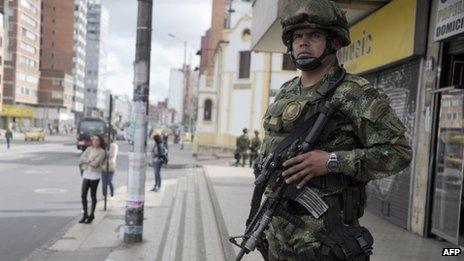Colombia troops to patrol Bogota after protests
- Published

President Santos said violence overnight in Bogota was unacceptable
Colombia is deploying troops in the capital, Bogota, following violent protests in support of a strike by small-scale farmers.
Colombian President Juan Manuel Santos said the troops were needed "to assure normality".
Clashes with police broke out after thousands of people took to the streets in support of the farmers. At least two people have died.
Farmers say government policies are driving them into bankruptcy.
"Last night, I ordered the militarisation of Bogota and I will do the same today in any municipality or area that needs the presence of our soldiers," President Santos said in a televised address after an overnight cabinet meeting.
"It's unacceptable that the actions of a few impact the lives of the majority."
On Friday, the farmers' leaders said they would no longer block highways but would retain roadside pickets.
They said they would resume negotiations with the government on Saturday.
Water cannon
President Santos also said he was deploying up to 50,000 troops on the nation's road network to counter protests and blockages.
He had earlier described the protests as "valid", but urged demonstrators to keep them peaceful.
Clashes broke out on Thursday afternoon after tens of thousands of people marched peacefully in support of a 10-day protest by small-scale farmers.
Correspondents said masked youths threw stones and bricks, and fought riot police who responded with tear gas and water cannon.
The two deaths occurred overnight in the western districts of Suba and Engativa, although the circumstances are not yet clear, Bogota security chief Alfonso Jaramillo said.
Riot police clashed with protesters in several areas on Bogota
Interior Minister Fernando Carrillo said that those who had resorted to violence were "vandals, not farmers".
The protests have united potato growers and milk producers with teachers, health workers and students.
Roadblocks set up by protesters have disrupted food supplies to major cities and towns.
On Wednesday the government announced measures - including better prices for agricultural products and more access to loans - to ease the pressure on farmers.
The government also promised more protection from products imported at lower prices from countries with free-trade agreements with Colombia.
But the small-scale farmers have so far rejected the government's offer.
They say that free trade agreements with the European Union and the US, which have recently come into force, are flooding the market with agricultural products at prices they are unable to match.
They also complain that rising fuel and production costs have turned small-scale farming into a loss-making business.
- Published28 August 2013
- Published27 August 2013
- Published24 August 2013